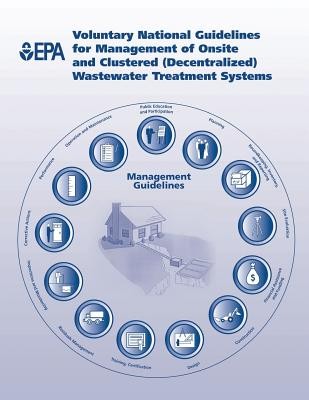
- We will send in 10–14 business days.
- Author: U S Environmental Protection Agency
- Publisher: CreateSpace Independent Publishing Platform
- ISBN-10: 1514380544
- ISBN-13: 9781514380543
- Format: 21.6 x 28 x 0.3 cm, softcover
- Language: English
- SAVE -10% with code: EXTRA
Voluntary National Guidelines for Management of Onsite and Clustered (Decentralized) Wastewater Treatment Systems (e-book) (used book) | bookbook.eu
Reviews
Description
EPA has developed the Voluntary National Guidelines for Management of Onsite and Clustered (Decentralized) Wastewater Treatment Systems to raise the level of performance of onsite and clustered wastewater treatment systems through improved management programs. Decentralized wastewater treatment systems are defined here as individual onsite or clustered wastewater systems (commonly referred to as septic systems, private sewage systems, individual sewage treatment systems, onsite sewage disposal systems, or "package" plants) used to collect, treat, and disperse or reclaim wastewater from individual dwellings, businesses, or small communities and service areas. Such systems may provide an alternative to conventional centralized wastewater systems. However, any onsite or clustered wastewater treatment system that discharges pollutants from a point source to waters of the United States is subject to the National Pollutant Discharge Elimination System (NPDES) program under the Clean Water Act (CWA). Such discharge is illegal and subject to enforcement action unless it is authorized by an NPDES permit issued by an authorized state or tribe or by EPA. Onsite and clustered systems can be protective of public health and water quality if they are properly planned, sited, designed, constructed, installed, operated, and maintained. EPA is issuing this guidance to raise the quality of management programs, suggest minimum levels of activity, and encourage institutionalizing the concept of management. Implementation of the Management Guidelines can help communities meet water quality and public health goals, provide a greater range of options for cost-effectively meeting wastewater needs, and protect consumers' investment in home and business ownership. In a number of instances, decentralized wastewater treatment systems without proper management programs have failed in the long term because of lack of proper operation and/or maintenance and have had to be replaced by centralized systems. If centralized collection systems are feasible, decentralized systems are recommended only where there is assurance of an enforceable management system consistent with this strategy, including long-term financial and technical capacity for operation and maintenance.
EXTRA 10 % discount with code: EXTRA
The promotion ends in 16d.13:07:55
The discount code is valid when purchasing from 10 €. Discounts do not stack.
- Author: U S Environmental Protection Agency
- Publisher: CreateSpace Independent Publishing Platform
- ISBN-10: 1514380544
- ISBN-13: 9781514380543
- Format: 21.6 x 28 x 0.3 cm, softcover
- Language: English English
EPA has developed the Voluntary National Guidelines for Management of Onsite and Clustered (Decentralized) Wastewater Treatment Systems to raise the level of performance of onsite and clustered wastewater treatment systems through improved management programs. Decentralized wastewater treatment systems are defined here as individual onsite or clustered wastewater systems (commonly referred to as septic systems, private sewage systems, individual sewage treatment systems, onsite sewage disposal systems, or "package" plants) used to collect, treat, and disperse or reclaim wastewater from individual dwellings, businesses, or small communities and service areas. Such systems may provide an alternative to conventional centralized wastewater systems. However, any onsite or clustered wastewater treatment system that discharges pollutants from a point source to waters of the United States is subject to the National Pollutant Discharge Elimination System (NPDES) program under the Clean Water Act (CWA). Such discharge is illegal and subject to enforcement action unless it is authorized by an NPDES permit issued by an authorized state or tribe or by EPA. Onsite and clustered systems can be protective of public health and water quality if they are properly planned, sited, designed, constructed, installed, operated, and maintained. EPA is issuing this guidance to raise the quality of management programs, suggest minimum levels of activity, and encourage institutionalizing the concept of management. Implementation of the Management Guidelines can help communities meet water quality and public health goals, provide a greater range of options for cost-effectively meeting wastewater needs, and protect consumers' investment in home and business ownership. In a number of instances, decentralized wastewater treatment systems without proper management programs have failed in the long term because of lack of proper operation and/or maintenance and have had to be replaced by centralized systems. If centralized collection systems are feasible, decentralized systems are recommended only where there is assurance of an enforceable management system consistent with this strategy, including long-term financial and technical capacity for operation and maintenance.


Reviews